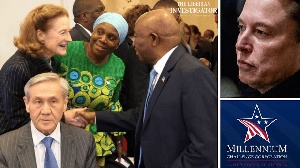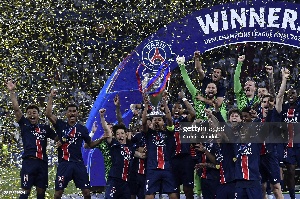Africa News of Thursday, 24 April 2025
Source: www.ghanawebbers.com
Liberia's $500m MCC Dream On Shaky Ground Amid Looming U.S. Shutdown of Agency
Monrovia — President Joseph Nyuma Boakai recently celebrated Liberia's eligibility for a second Millennium Challenge Corporation (MCC) compact. This compact could be worth up to $500 million. However, a POLITICO report raises concerns about this achievement. The U.S. Department of Government Efficiency (DOGE), led by Elon Musk, may shut down the MCC. This uncertainty puts Liberia's infrastructure and development plans in jeopardy.
The MCC released its FY2025 scorecards on November 21, 2024. These scorecards evaluate 76 countries for five-year grant agreements called compacts. Out of these countries, 26 passed, including Liberia. The scorecards assess performance across 20 indicators related to economic freedom, governance, and human investment.
Liberia worked hard to meet the MCC's benchmarks on corruption and democratic rights. After years of reform and investment in good governance, this news is troubling. Losing the MCC funding would be a significant setback for Liberia.
In December 2024, President Boakai called the MCC qualification "a victory for all Liberians." The government had made strides in transparency and civil liberties to qualify among the 26 nations eligible for the compact. The potential grant promised hope for rebuilding infrastructure and boosting economic growth.
Finance Minister Augustine Kpehe Ngafuan engaged with MCC leaders after this announcement. He expressed optimism about Liberia’s readiness for the compact discussions. Ngafuan praised an intra-governmental task force that tracked MCC indicators and promised timely completion of necessary analyses.
However, if DOGE proceeds with shutting down the MCC, it would freeze existing compacts and lay off staff members. This agency has been recognized for its transparency but now faces closure due to DOGE's efficiency campaign.
The implications for Liberia are severe. The MCC Compact represents credibility and reform efforts on a global scale. It rewards progress in democracy and anti-corruption initiatives while supporting vital infrastructure projects in Liberia.
Until now, plans seemed clear for moving forward with the compact process. A technical delegation from the MCC visited Monrovia earlier this year to finalize staffing and prepare operations there. Jason Small assured Liberians of their commitment to improving lives through collaboration.
But POLITICO's report suggests trouble ahead. An internal email indicates DOGE will propose terminating grant programs soon—potentially within 90 days. With Compact II still in preliminary stages, it may never reach implementation.
This shutdown does not stem from poor performance by the MCC itself; it has maintained clean audits over many years according to an employee statement obtained by POLITICO. Instead, DOGE appears focused on dismantling foreign aid institutions as part of a broader ideological shift against international development spending.
Senator Jim Risch introduced legislation last December aimed at expanding MCC’s authority—showing bipartisan support exists for the agency’s mission. However, it remains uncertain whether Congress can act quickly enough against DOGE’s plans amid leadership changes following Tesla's earnings report.
Liberia must remain vigilant despite initial excitement over receiving approval from the MCC program; cautionary notes highlighted ongoing issues in health care, education, and fiscal governance that need addressing immediately if transformative results are expected from any future compact agreement.
Minister Ngafuan emphasized that political victories should benefit all Liberians consistently—not just during election years—but now they face losing one of their most significant anticipated wins.











